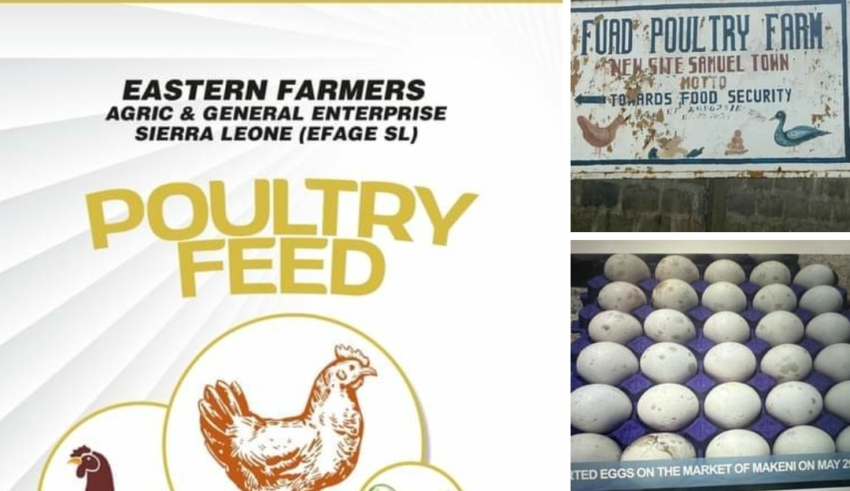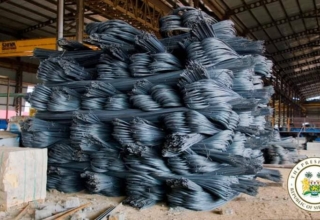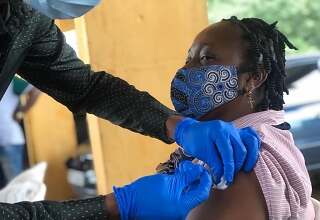
𝐁𝐲 𝐒𝐚𝐡𝐫 𝐋𝐚𝐡𝐚𝐢 𝐉𝐮𝐬𝐮
Sahr Lahai Jusu in his recent analysis – Feed Salone. The Need to Promote Local Poultry Farmers – is right to highlight the issues faced by local poultry producers trying to be more productive in Sierra Leone’s challenging environment.
The profit margins for poultry farming are very tight and efficient farm management is essential to bring broilers to weight in the shortest time possible and ensure layers are laying eggs, as well as eating food. Take the example of commercial poultry farmers in Brazil, the world’s second largest chicken meat producer. Their competitive advantages over Sierra Leonean poultry farmers include widely available ingredients for feed at much lower cost, and a whole subsector of suppliers offering feed products for every stage of growth for both broilers and layers. Similarly, there is range of suppliers of day-old chicks and importantly easy access to veterinary services and medications. This leaves the farmer free to concentrate on the core business of managing their farm. These essential support services are not easily available in Sierra Leone and farms are often forced to find their own solutions.
Invest Salone, a UK funded private sector development initiative, has been working actively with the poultry sector, compiling research such as our recent Poultry Feed Sector Assessment – and supporting several local firms to help them grow so they are able to chip away at the mountain of imported meat and eggs that eat up Sierra Leone’s valuable foreign exchange.
Leecon, one of the firms we have worked with, has been able to develop its own feed production system, including working with farmers to help them to grow maize. Leecon is now developing its own hatchery. While this approach, through vertical integration, may not ultimately be as efficient as one with specialised service providers, it is a practical solution to the challenges Leecon is facing and will allow it to grow and expand production. There is no lack of market for their eggs.
Mr Sahr Lahai Jusu also suggests that by taxing and limiting imports and subsidising maize production, the Government could support the drive towards self-sufficiency. Protecting local producers with import duties and quotas is often justified through the “infant industry” argument which proposes that fledgling industries need a period of protection because they lack the experience and size to compete effectively against established competitors abroad. While there are some cases where this has worked, there are many where it has not. When it fails, it is often because industry protectionism may remove the incentive for the developing industry to become efficient and competitive and so it does not innovate and invest. Consequently, the requirement for protection remains and so do the measures. This means consumers are paying more than they would have done for goods that would have otherwise been cheaper if imported. Governments can also become reluctant to give up the income they are gaining from the duties. Cheaper eggs and chicken make an important contribution to food security and nutrition in Sierra Leone and the impact of increasing these prices even temporarily needs to be carefully considered.
The issue of subsidising maize production also has some potential downsides. Again, the underlying problem is low productivity. The sector needs to be mechanised and use good quality seeds and inputs. Any subsidy would have to be targeted to achieve this end. Of course, the other key consideration is that funds for this would have to come from somewhere and be justified as the best use of scarce government resources. Finally, experience suggests that farmers become very attached to subsidies, and it is hard to take them away once they have been established.
Perhaps the most successful approach to growing the poultry sector would be a two-pronged strategy:
Firstly, support to the existing poultry companies through the provision of stronger government services and a generally supportive business environment.
Secondly – a push to attract some large-scale poultry investments into the country. Large scale commercial feed companies and poultry farms could overcome many of the challenges facing smaller companies without putting them out of business. In fact, vital inputs would become more readily available to them through the impact of these larger companies.
For more information and to read our published research, please visit our website at investsalone.com.
Feed Salone…the Need to Promote Local Poultry Farmers
By Sahr Lahai Jusu
Like s teveral other agribusinesses that have great potential for both scale and profitability, poultry farming is a smart decision to make. It is not only a business which is critical to the healthy consumption structure in the world, it is a profitable business that creates jobs and increases income levels of the farmers. However, most of the poultry farms are closing down due to lack of support to access complete poultry feed and power. Starting a complete poultry feed production in Sierra Leone will contribute to completing the value chain and will contribute positively to the Government Feed Salone Agenda.
As an Economist, sponsored by Eastern Farmers Agric and General Enterprise (EFAGE) in April this year I conducted a quick assessment of the demand for poultry products in the country. Among the farms surveyed were one of the largest poultry farms in Makeni, Lion Poultry that has 22,000 layers and 16,000 chicks. The purpose of the visit was to have a hands-on experience on the operations, opportunities and challenges poultry farmers are facing in Sierra Leone. Similar visit was made to another farm in Waterloo, Fuad Poultry Farm that has 8,500 layers and broilers.
Furthermore, review of studies conducted by relevant agencies, including the Ministry Agriculture and Food Security (MAFS), jointly by the University of Makeni (UNIMAK), SBD and St Lawrence Foundation, and recently by the Pig and Poultry Farmers Association of Sierra Leone (PPASL), reveal that local poultry farmers in Sierra Leone produce on average between 67-90 million eggs a year. The rest of eggs accounting for 65-70 percent are imported. To meet the expected annual national demand of about 8.5 million population farmers should be able to produce between 150 -182 million eggs. However, more than 70% of the 130+ farmers produce their own feeds while few buy from other farmers or import low quality feeds from neighboring countries. This is akin to a hypothetical situation where every building contractor produces his/her own cement to build a house.
Challenges
There are two major constraints facing the poultry sector that limit production and expansion:
1. Expensive Feed: In the poultry production value chain, there should be dedicated enterprise feed producers to sell the feed to the farmers. This will take away the hassle of buying maize, concentrates, wheat brans, oyster shells and more importantly feed formulation. Unfortunately, dedicated complete feed producing enterprises are virtually non-existent in Sierra Leone to meet the total demand.
2. The second binding constraint facing local poultry farmers is the pricing curve for eggs and poultry meat. Locally produced eggs, though fresh and nutritious are more expensive than the imported ones. As a result, consumers, particularly low-income consumers, look for cheaper eggs regardless of the quality. Demand and invariably sales for locally produced poultry products are lower than demand for the imported.
Recommendations
Based on the above challenges the following recommendations are suggested by local poultry farmers:
1. Government to implement policies similar to that of countries like Senegal and Nigeria; namely: introduction of a gradual quota system, combined with defensive tariff regime for imported products. For instance, the restoration of taxes and duty on imported rice while providing subsidies to local rice farmers will eventually create an equilibrium pricing system leading to more demand for locally produced rice and increased income to the farmers. Therefore, increased tariff and quota system could lead to parity in the market, increase demand and hence sales, with the resultant growth of locally produced eggs and poultry meat, creating more jobs for women and youths.
2. About 70% of owners and poultry farm workers are women and youths in Sierra Leone. Closure of poultry farms due to feed constraints and market prices leads to nearly 2000 youths and women losing jobs. However, according to research conducted by the University of Makeni, SBD and St Lawrence Foundation on the theme “Towards Self-Sufficiency in Sierra Leone’s Poultry Industry”, it is projected that Sierra Leone can achieve Zero Eggs Import by 2029, if feed inputs supply particularly maize is produced locally and appropriate quota and tariff regime are consistently applied to protect local farmers. Maize and wheat bran that could be locally sourced, are largely imported from neighboring countries. Therefore, increased subsidies to maize growers supported by extension services could lead to low input costs to feed producers and hence low cost of production of eggs and poultry meats. Government support to capacity building in poultry farm management, hygiene, feed formulation and application as well as market sensitization about product quality is also important for market growth.
3. Completely lacking in Sierra Leone and which is of significance importance to growth and protection of incomes is an insurance scheme for poultry farmers. Many other countries in sub-Saharan Africa – for example Ghana, Cameroon, Kenya, and Uganda, have robust insurance schemes in place against bird fatalities and risk mitigation against essential infrastructure. A key sustainability pillar in the poultry sector within the context of Feed Salone is a strong need to minimize income losses and incentivize investors towards large scale poultry farming in Sierra Leone. With these, the target of zero egg import by 2029 will be realized under the GoSL’s flagship program, Feed Salone.
—————————————————————————————————————–
Broiler chickens take an average of 48 days to grow from hatching to a consumable size1. The growth process can be divided into three phases:
1. Broiler Starter Phase: 0 to 10 days
2. Broiler Grower Phase: 11 to 25 days
3. Broiler Finisher Phase: 26 to 42 days or longer2.
Learn more:

















